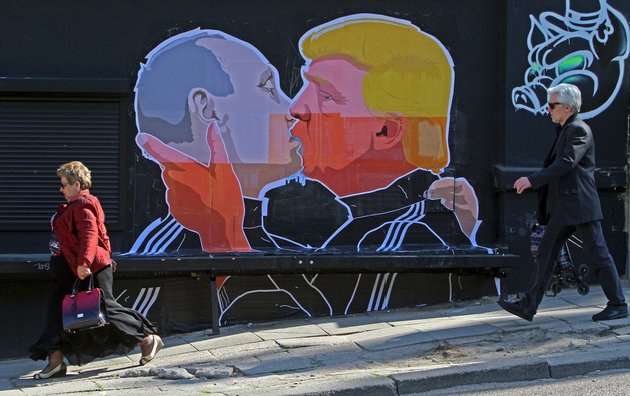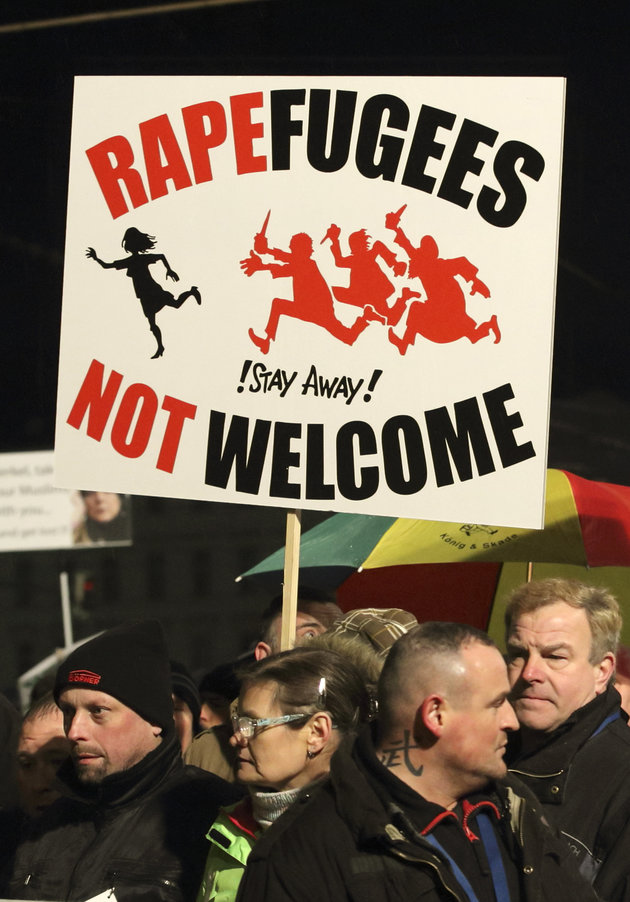
People walk past a mural on a restaurant wall depicting presidential hopeful Donald Trump and Russian President Vladimir Putin greeting each other with a kiss in the Lithuanian capital Vilnius on May 13, 2016.
CLEVELAND ― While the nation obsessed over Melania Trump’s plagiarism and other oddities during the first day of the Republican National Convention, something much wilder ― and more telling about the substance of a potential Trump presidency ― went down largely unnoticed.
Team Trump proved that they now have such a tight grip on the Republican Party that they can force the entire institution to adopt their view of one of America’s chief foreign policy concerns: how to handle Russia’s paranoid, populist autocrat and his efforts to assert himself abroad.
On the same day the Washington Post revealed that the Trump campaign had gutted an anti-Russian provision in the GOP platform, the stage was turned over in prime time to a retired general who has quite literally been on the payroll of Moscow. Added to a dizzying array of past Trump-world connections to Russian President Vladimir Putin, Monday’s events solidified the notion that Putin and the current incarnation of the GOP have never been closer.
In the face of near-universal wariness of Putin among foreign policy experts on both sides of the aisle, Donald Trump has cheered the former KGB agent on as an effective leader.
Who’s to blame for the tensions between Putin and the West? Weak Europeans, for failing to deal with their continent’s problems, and President Barack Obama, for failing to make Putin respect him. Add in, of course, anyone who has a problem with Putin’s persistent support for the dictator of Syria, a man Trump sees as an “A”-grade leader despite his responsibility for the rise of the Islamic State group and the ongoing refugee crisis, and others who dispute Putin’s cleverly twisted depiction of American foreign policy.
To Trump and his collection of fans who back authoritarian leadership, “traditional” society and publicity stunts, Putin’s moves to punish LGBT people for the sake of orthodox family values, winks to his country’s racists and publicly staged paeans to masculinity make him a hero.
So it wasn’t entirely surprising to hear from the Post that Trump lieutenants stopped the GOP platform from expressing support for arming Ukraine ― even after Putin’s 2014 invasion of the country sparked an ongoing conflict that’s claimed thousands of lives and left millions of Eastern Europeans scared that their nations would be next.
It was simply proof of how far the presumptive nominee and his team will go to stay on Moscow’s good side.
Thwarting the GOP activist who offered the amendment, Trump deputies successfully killed an endorsement of “providing lethal defensive weapons” to Ukraine and swapped in a vague reference to “appropriate assistance.”
Obama has also so far refused to provide lethal support to Ukraine. And many Americans have shown this election cycle that they would prefer to be less militarily involved around the world. But the position is in stark contrast to the consensus view of the GOP foreign policy elite.
It’s tempting to chalk the reversal up to the popularity of Trump’s pseudo-isolationist foreign policy rhetoric. Trump has exposed that the Republican party’s rank-and-file members are much less interventionist than previously thought. While keen to bomb, torture or take other violent steps that have little chance of claiming American lives, they don’t want to invade or occupy ― the lessons and losses of Iraq are too fresh.
Many Republican voters appear to resemble far-right Europeans, with their hatred of globalization and immigrants, more than they do the trade enthusiasts or fiscal hawks who represent the GOP in Congress. The leaders of many such European parties have cultivated deep ties with Putin. They regularly promote Russia’s argument that the leaders of the West are trying to provoke a war for their own shady globalist ends ― for corporations, U.S. defense manufacturers, advocates of open borders and other “traitors” to their nations. So there’s a model for this.

Members of LEGIDA, the Leipzig arm of the anti-Islam movement Patriotic Europeans Against the Islamisation of the West, take part in a rally in Leipzig, Germany.
But there’s something more insidious going on here, too. Since Trump first began to reveal himself as a fan of Putin, scores of media investigations have uncovered a shady web of connections between many of Trump’s top advisers and Putin’s friends. There’s increasing evidence that the pro-Russia bent is about profit at least as much as it is about principle.
Take retired Lt. Gen Michael Flynn, a Trump booster who was recently floated as a potential vice-presidential pick. Before his prime-time appearance on the convention stage Monday, Flynn sat down with investigative reporter Michael Isikoff of Yahoo News.
Isikoff wanted to know about the general’s ties to Russia’s Putin-friendly news outlet RT, and asked about a high-profile appearance Trump’s favorite general made in Moscow in December at a celebration for the channel. By appearing by Putin’s side, Flynn supported Russia’s narrative that right-thinking folks in the West know Putin is justified in constantly blaming Washington for global problems and downplaying his own responsibility.
Isikoff asked Flynn if he had been paid. “You’d have to ask my ― the folks that I went over there on behalf of,” Flynn said, during an exchange that starts at around the 22-minute mark in this video.
Isikoff pressed. “I’m asking you. You’d know if you were paid,” he said.
“Yeah. I went over there as a speaking event,” Flynn confessed. “What difference does that make? Did somebody go, ‘Oh, he’s paid by the Russians?’”
Isikoff noted that Trump has routinely slammed Hillary Clinton for her speaking fees from Goldman Sachs and others, claiming they create a conflict of interest.
“I didn’t take any money from Russia, if that’s what you’re asking.”
“Well, then who paid you?”
“My speakers bureau,” Flynn said. “Ask them. I was given an opportunity and I took it.”
But of course, a speakers bureau doesn’t pay speakers, it acts as a go-between. Flynn is presumed to be the leading candidate to be director of national intelligence in a Trump administration. His bureau did not respond to a Huffington Post request for more details about the appearance.
Trump’s campaign manager, Paul Manafort, is less shy about receiving cash from Putin-world. Manafort spent years working for Putin’s preferred leader in Ukraine, former President Viktor Yanukovich. His successful effort to help the Kremlin proxy win a 2010 election set the stage for Yanukovich’s venal, authoritarian rule and the eventual uprising against it that sparked the current Ukraine crisis.
Another wealthy buddy of Putin’s, Oleg Deripaska, has business ties to Manafort that have embroiled the GOP operative in an investigation in the Cayman Islands, according to a Yahoo News investigation.
This pattern of Trump cronies taking softer positions on Russia for their personal gain extends to a less well-known figure with even more direct influence over Trump’s foreign policy: energy executive Carter Page. A speech he gave this month in Moscow revealed that he’s mastered Putin-speak, with its focus on U.S. hypocrisy abroad, the futility of talking about “human rights” and the way America is faltering at home. From The Washington Post:
He generally avoided questions on U.S. foreign policy, but when one attendee asked him whether he really believed the United States was a “liberal, democratic society,” Page told him to “read between the lines.”
“If I’m understanding the direction you’re coming from, I tend to agree with you that it’s not always as liberal as it may seem,” he said. “I’m with you.”
The Trump adviser has echoed Russian media’s line on the situation in Ukraine: it is a result of State Department meddling rather than Russian saber-rattling.
Inevitably, there are other reasons for Page to dislike the U.S. approach. The sanctions that followed Russia’s invasion of Ukraine have had dire financial consequences for him ― and a re-opening to Russia would boost his coffers.
These aren’t new revelations. What’s striking is that these are the people Trump has chosen to surround himself with, knowing their positions and their financial ties. Now that he’s succeeded, so will, in a sense, their views and their interests. But that’s likely something he’s comfortable with, given his own long interest in and ties to Russian money.
A Washington Post investigation into those connections found that Trump has proven willing to overlook Russian excesses, be it in trampling rights or pushing anti-Americanism abroad, in his pursuit of a buck.
If he makes it to the White House, there’s every reason to believe that Trump will shape foreign policy in a way that neatly combines his apparent anti-interventionism with his stated dreams for his business. If he’s really lucky, he’ll get that Trump Tower in Russia that he’s been dreaming of.
- Publish my comments...
- 0 Comments
